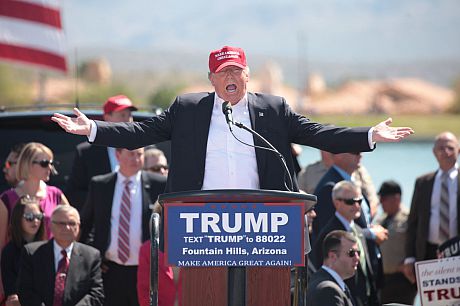L. Alan Winters, Professor of Economics and Director of UKTPO.
Donald Trump viewed Brexit as a great victory. He also said that the UK would not be at the back of the line for trade deals – perhaps because there would be no line! But where does Trump’s victory leave the overall strategy of Brexit? It makes keeping good access to the EU market – some form of soft Brexit – even more important than it was previously.
For many years one of the arguments that politicians have made for signing free trade agreements has been to try to lock in access to a friendly market as an insurance policy against the world turning more protectionist. We don’t know what is going to happen, of course, but Donald Trump the Candidate spoke of protecting American markets and, despite the friendly noises, it is not plausible that UK exports will be exempted from this protection to such an extent that they take the US market by storm.

By Gage Skidmore from Peoria, AZ, United States of America (Donald Trump) [CC BY-SA 2.0 (http://creativecommons.org/licenses/by-sa/2.0)], via Wikimedia Commons
And from the reaction of global markets today, the chances of world trade and world income taking a significant hit also seem pretty high. So, all told, this is exactly the time when being on the inside of the largest market in the world would seem desirable.
More specifically, the USA is the UK’s second largest export market, taking 12.9% of total goods exports in 2013-2015 and 23% of cross-border services in 2014. After that comes China. Trump’s stated intentions are bad news for Chinese exports and, following from that, Chinese incomes and expenditure. So, a Trump presidency is likely to weaken the UK’s two largest non-EU markets.
| Exports
value ($B) |
Exports Share (%) | Imports value
($B) |
Import Share (%) | |
| 2013-15 | 2013-15 | 2013-15 | 2013-15 | |
| EU | 226.7 | 45.1% | 350.9 | 53.8% |
| USA | 64.2 | 12.9% | 57.1 | 8.8% |
| China | 24.0 | 4.8% | 61.6 | 9.4% |
When markets number 2 and 3 are under threat, why would we want to compound the challenges by willingly reducing access to market number 1 by failing to negotiate decent access?
This is exactly the time that Europe needs to be able speak as one
And then there is politics. Again, of course, we do not know, but if President Trump is going to undermine the (somewhat) cooperative and rules-based international system that the USA created for us in the middle of the last century (e.g. the WTO, IMF, World Bank, NATO), this is exactly the time that Europe needs to be able speak as one and maintain those values while the USA goes through a bad patch. If the EU and the UK are distracted by horse-trading over, say, the mutual recognition of car parts, Europe will be correspondingly less able to help itself and the world in this way.
So, what to do? First, we need to agree that Brexit will be cooperative in both process and outcome. Second, we need to recognise that if the worst comes to the worst we may have to put it on hold while Europe deals with an even larger disturbance to the post-war order.
Disclaimer:
The opinions expressed in this blog are those of the author alone and do not necessarily represent the opinions of the University of Sussex or UK Trade Policy Observatory.
Republishing guidelines
The UK Trade Policy Observatory believes in the free flow of information and encourages readers to cite our materials, providing due acknowledgement. For online use, this should be a link to he original resource on the our website. We do not however, publish under a Creative Commons license. This means you CANNOT republish our articles online or in print for free.